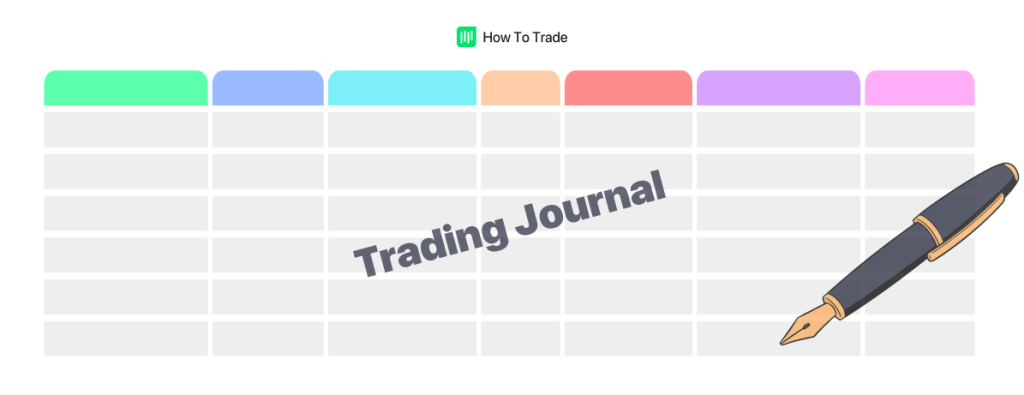Incorporating Trading Psychology in your Trading Journal
As we mentioned repeatedly throughout this course, trading psychology is perhaps the most important part of trading, and writing a trading journal can make you a better trader. And, writing down your trade results in a trading journal is a great trading psychology tool used by many successful traders. It’s not only about whether you won or lost a trade but it’s also important to note how you felt when it happened as you can learn from failures in your past trading performance.
Our suggestion, it’s time you started a psychological trading journal so you can understand your trading process and analyze your past performance! So, let’s see why it’s useful to use a trading journal and how top traders use it to get the best future returns.
Why a Trading Journal is Important to Your Trading Career?
Well, did you know that the forex market has tendencies? Yup, that’s right and the same way it tends to react to market events and environments, you as a trader also tend to behave in certain ways, either through your reactions or trading behavior. And the truth is, we often overlook these tendencies and the effect they have on our performance. In a nutshell, understanding trading psychology can help you learn from your mistakes and eventually improve your trading results.
You see, through our lives we develop coping mechanisms to help us deal with situations of distress. For example, the first time you touched a boiling kettle, you’ve learned that it can be incredibly hot. To avoid the same experience and pain, you’ve learned to only touch the handle of the kettle. Eventually, coping mechanisms like these turn into habits and come to us naturally.
But not all coping mechanisms we develop are positive. Sometimes, we develop coping mechanisms that lead us to behave in a certain way and make not-so-great trading decisions. We are all guilty of this. Seriously, just think about it. How many times have you let go of a winning trade just because the market moved against you for a little while? Probably more than once. And afterward? You were probably beating yourself up about it knowing you could’ve won that trade if you had just followed your trading strategy in the first place.
And that’s one of the main reasons why most traders and even some of the best traders keep a psychological journal as part of their trading plan – to help them recognize the negative patterns in their trading behaviors.

Three Ways to Incorporate Your Trading Psychology in a Trading Journal
Are you ready to start your own trading journal for successful trading? You can check our free trading journal template. Below we will discuss some tips and trading rules to get you started!
Describe What’s Happening in the Market
First, write down what’s currently happening in the forex market and why you think your trade is going to move in your desired direction. Ask yourself, what the dominant themes of the market are right now? What’s the risk you take in entering this trade? Are your trades in line with your risk management strategy? Did you choose the right risk-reward ratio? If you’re happy with placing your trade once you’ve answered these questions, move on to the next step!
Secondly, you can also write some important notes to make it an effective trading journal. Take a quick look at the economic calendar and write down all the important events you need to follow in the forex market on the same trading day or week. Moreover, if you found a profitable strategy you want to explore or a technical analysis indicator, write it down (From my personal experience, it’s frustrating to forget the name of an indicator you liked using).
If you are trading stocks, you can write down the stocks you want to follow and the most important events to follow in the stock market.
Are You Feeling Good?
Now that you’ve covered what’s happening in the forex or stock market and why you believe the trade will go in your direction, it’s time to ask yourself some questions about YOU. It sounds like a cliche, but it will help in understanding trading psychology in creating the perfect trading process.
How are you feeling? What are you thinking? Are you going through any stressful periods at the moment? It may feel weird writing about your emotions at first, especially if you’ve never done it before but it will be worth it down the line when you start recognizing your behavioral patterns.
It doesn’t matter how small the things affecting your mood are, WRITE IT DOWN! There’s nothing too small and there’s nothing too big. Write down every little thing, every possible factor that could be impacting your decision-making (even if it is a bad hair day).
Write Down Your Trading Performance Results
Lastly and most importantly, note the outcomes of all your trades to determine the emotions that have influenced your trades whether they’re positive or negative. That’s the purpose of a trading journal. Remember, the goal is to recognize behavioral patterns and their consequences and to get familiar with your own trading psychology.
If you find it difficult or time-consuming to write down all your trades every trading day, use screenshots of your winning and losing trades or you can ask your broker to give you the trading activity on your trading account for the specified period. At the end of each day, week or month, you can go back to your trading journal and analyze your trading performance as well as your trading strategy.
Once you’ve got enough ‘data’ in, you will be able to clearly identify the impact these behavioral patterns have on your trading strategy and eventually refrain from them if they re-occur.
The Bottom Line
Having a successful trading career without a trading plan is not a realistic scenario. In order to become a profitable trader having a consistently successful rate of winning trades, you need to know your plan, goals, and process. It’s not an easy profession and having the right mindset is vital to your trading success.
While some people can keep a very simple trading journal that includes the number of trades and P&L extracted directly from a trading account, other traders might want to include more information in their trading journals – market conditions, their investment needs, their financial conditions, trading goals, trading psychology, feelings and emotions, a trading plan, reasons why you think you lose money in trading, to do and not-to-do list, etc. But the bottom line, all forex traders are advised to keep a trading journal, and especially novice traders who must follow their overall performance. Ultimately, it will help you create a trading plan and become a successful trader.

